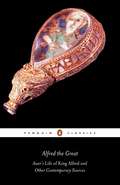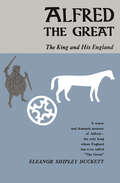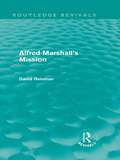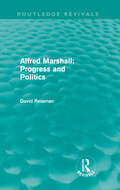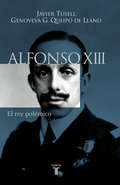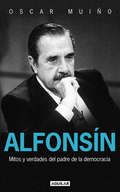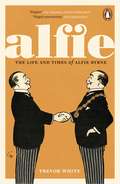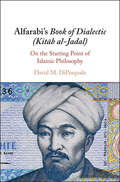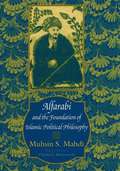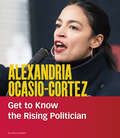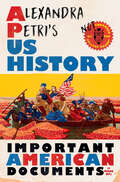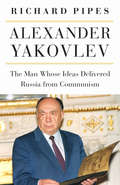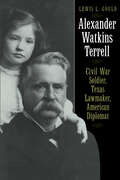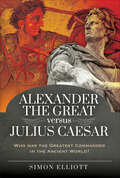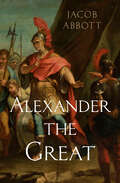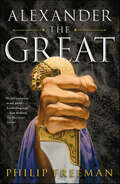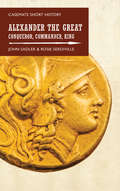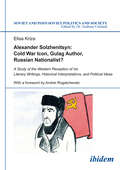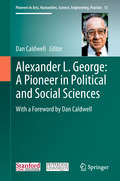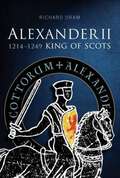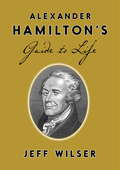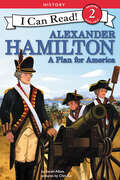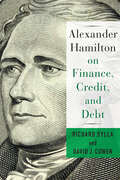- Table View
- List View
Alfred the Great: Asser's Life of King Alfred and Other Contemporary Sources
by AsserAsser's Life of King Alfred, written in 893, is a revealing account of one of the greatest of medieval kings. Composed by a monk of St David's in Wales who became Bishop of Sherborne in Alfred's service and worked with him in his efforts to revive religion and learning in his kingdom, this life is among the earliest surviving royal biographies. It is an admiring account of King Alfred's life, written in absorbing detail - chronicling his battles against Viking invaders and his struggle to increase the strength and knowledge of his people, and to unite his people at a time of conflict, uncertainty and war.
Alfred the Great: The King and His England (Phoenix Books Series)
by Eleanor Shipley Duckett<p>From the author of The Gateway to the Middle Ages, “a fascinating portrait of an enlightened monarch against a background of darkness and ignorance” (Kirkus Reviews).<p> <p>Filled with drama and action, here is the story of the ninth-century life and times of Alfred—warrior, conqueror, lawmaker, scholar, and the only king whom England has ever called “The Great.” Based on up-to-date information on ninth-century history, geography, philosophy, literature, and social life, it vividly presents exciting views of Alfred in every stage of his long career and leaves the reader with a sharply etched picture of the world of the Middle Ages.<p>
Alfred Marshall's Mission (Routledge Revivals)
by David ReismanAlfred Marshall was anxious to do good. Intended by an Evangelical father for the vocation of clergyman, the author of the mould-shaping Principles of Economics remained to the end of his days a great preacher deeply committed to raising the tone of life. First published in 1990, Alfred Marshall’s Mission explains how this most moral of political economists sought to blend the downward sloping utility function of Jevons and Menger with the organic evolutionism of Darwin and Spencer, how this celebrated theorist of social alongside economic growth sought to combine the mathematical marginalism of Cournot. Thunen and Edgeworth with the ethical uplift of Green, Jowett and Toynbee. The conclusion reached is that perhaps Marshall was, after all, too anxious to do good. Far more economists, however, have been not anxious enough; and that in itself gives this study of Marshall’s life and times a present day relevance which would, no doubt, have appealed strongly to the shy Cambridge professor who is its subject.
Alfred Marshall: Progress And Politics (Routledge Revivals)
by David ReismanFirst published in 1987, Alfred Marshall: Progress and Politics provides an enlightening insight into Marshall's thoughts on social improvement, adaptive upgrading, policy and polity. He planned books on these subjects which he never subsequently wrote, but the thesis of this work is that a close study of such writings as Marshall did complete makes possible a very detailed reconstruction of the important contribution which Marshall was capable of making to Victorian evolutionary thought (much in the shadow of Darwin and Spencer). In the ongoing debate on the political element in political economy, he reveals himself to have been as much an eclectic as was Adam Smith and as much a man of commitment as was T. H. Green.
Alfonso XIII. El rey polémico
by Javier TusellUna biografía de Alfonso XIII resulta imprescindible porque es uno de los protagonistas fundamentales de la historia española del siglo XX. Aunque Alfonso XIII es uno de los protagonistas fundamentales de la historia española edl siglo XX, a menudo no se ha profundizado suficientemente en la figura de este monarca. Poco controvertido en la mayor parte de su reinado pero blanco de todas las críticas en la fase final, Alfonso XIII sigue siendo hoy un rey polémico, incluso con mala fama en la memoria colectiva. Mientras que la derecha le ha acusado de falta de reacción frente a un parlamentarismo inestable y estéril, la izquierda le recuerda como un monarca autoritario y clerical, responsable del desastre de Annual y del golpe de Estado de 1923. Pero ¿cómo era verdaderamente el rey y qué papel desempeñó en la política del país? ¿Cómo funcionó el sistema de la Restauración y cuáles fueron sus posibilidades de evolución? ¿En qué consistió el difícil tránsito del liberalismo a la democracia y por qué no fue viable bajo el régimen monárquico? Este libro es fruto de toda una vida de dedicación por parte de los autores a este periodo cronológico pero también de la utilización de importantes fuentes rigurosamente inéditas. A partir de éstas se ha reconstruido de forma novedosa la trayectoria personal y política de Alfonso XIII, procurando hacerlo con imparcialidad, comparando su actuación con las de los otros reyes de la época y evitando anacronismos. Se ha tratado de comprender la personalidad - tanto en su faceta humana como política - de este monarca que accedió al trono en 1902, con dieciséis años de edad, y que abandonó España en 1931, haciendo un balance de sus rasgos positivos y negativos.
Alfonsín. Mitos y verdades del padre de la democracia
by Oscar MuiñoMitos y verdades del padre de la democracia. Puntero y estadista a la vez, tipificar a Raúl Alfonsín es tan difícil y fascinante como el mismo personaje. Podía tanto dialogar en pie de igualdad con Bill Clinton o con Felipe González como involucrarse en la conformación de una lista partidaria en el distrito más pequeño de la provincia de Buenos Aires. Quienes lo conocieron revelan en este libro un hombre en la intimidad familiar y en el ruedo político. Descuidado con las finanzas domésticas; audaz a la hora de trazar su propio camino partidario; decidido en l a defensa del régimen democrático; comprometido en la protección de los derechos humanos durante la dictadura. Tras levantar su voz para rechazar la recuperación de las islas Malvinas y exigir la restauración democrática luego de la caída de Puerto Argentino, derrotó por primera vez al peronismo en las urnas. Valiéndose de numerosos diálogos y testimonios de amigos, familiares, conocidos y adversarios, el periodista Oscar Muiño reconstruye la personalidad de un líder decisivo en la Argentina de las útlimas décadas del siglo pasado, cuya influencia sigue presente aun años después de su muerte.
Alfie: The Life and Times of Alfie Byrne
by Trevor WhiteThe first biography of the beloved long-time Lord Mayor of DublinAlfie Byrne was that rarest of things: a genuinely popular politician. He is still a figure of legend in Dublin, where he was elected Lord Mayor ten times. He was also a TD and a Senator; and only a backroom deal prevented him from contesting the race to become the first President of Ireland - a race he would have been favourite to win. Rising from inner-city Dublin to become known as the 'Lord Mayor of Ireland', he was a truly remarkable figure. And yet there has never been a biography of Alfie Byrne - until now.Trevor White's sparkling book tells the story of a man of many parts and contradictions. He was an urbane man of the world who left school at thirteen. He was a teetotal publican. He was a Parnellite who opposed violence, but he was sympathetic to the Easter rebels. His politics were fundamentally conservative, but he was deeply devoted to the poor of his native city.This is the story of an energetic young man who offered to lead his community and refused to stop governing for forty years. His ambition and charm won admirers in the great cities of the world - and in the tenements of Ireland's capital. At his best, he represented and encouraged a broader understanding of what it means to be Irish. And, through it all, he was a great personality, the living embodiment of Dublin.'Not just the definitive biography of the definitive Dubliner, Alfie is a wonderfully written social, political and cultural history of the country through the capital's most famous son through a tumultuous half century. At last, justice has been done to the legend that was Alfie Byrne.' Joe Duffy'Trevor White brings [Alfie Byrne] vividly to life in the pages of his elegant new biography' Leo Varadkar, Sunday Independent'White has found a deliciously rich seam to mine in Alfie Byrne ... Byrne's Dublin is revived in glorious Technicolor, and with much affection. It's a lively, boisterous, contradictory, occasionally maddening place, Much like the man himself, really.' Irish Times'Hugely entertaining ... This is the first proper account of his life, and it's bolstered by White's access to Byrne's family papers' Irish Independent'Peppered with delectable anecdotes ... Well researched and spryly written, this is an elegant account of one of our capital city's half-forgotten sons' Sunday Business Post'This enormously enjoyable biography doesn't seek to canonise Alfie, or to demonise him. It does what all good biographies should, which is simply to tell us the protagonist's true story; and it does what all great biographies should do, which is to make that story a delight to read.' Irish Daily Mail'Alfie could easily have been a sentimental rags-to-riches story about the son of a docker who escaped Sean O'Casey's "long haggard corridors of rottenness and ruin" to become a minor power broker among the bankers and lawyers while living in a Dublin 6 pile. Instead, White , who admires his quarry, doesn't pull punches when it comes to describing how the career of the genial Byrne eventually lost steam.' Sunday Times'Brilliantly told ... an inimitable portrait of Dublin for the forty-two years, 1914-56, that Alfie dominated the political scene' Cara'Trevor White has done today's citizenry some service in providing us with a balanced and well-researched account of the phenomenon that was Dublin's own Alfie Byrne' Dublin Review of Books
Alfarabi's Book of Dialectic (Kitāb al-Jadal): On the Starting Point of Islamic Philosophy
by David M. DiPasqualeWidely regarded as the founder of the Islamic philosophical tradition, and as the single greatest philosophical authority after Aristotle by his successors in the medieval Islamic, Jewish, and Christian communities, Alfarabi was a leading figure in the fields of Aristotelian logic and Platonic political science. The first complete English translation of his commentary on Aristotle's Topics, Alfarabi's Book of Dialectic, or Kitāb al-Jadal, is presented here in a deeply researched edition based on the most complete Arabic manuscript sources. David M. DiPasquale argues that Alfarabi's understanding of the Socratic art of dialectic is the key prism through which to grasp his recovery of an authentic tradition of Greek science on the verge of extinction. He also suggests that the Book of Dialectic is unique to the extent to which it unites Alfarabi's logical and political writings, opening up novel ways of interpreting Alfarabi's influence.
Alfarabi and the Foundation of Islamic Political Philosophy
by Muhsin S. MahdiIn this work, Muhsin Mahdi—widely regarded as the preeminent scholar of Islamic political thought—distills more than four decades of research to offer an authoritative analysis of the work of Alfarabi, the founder of Islamic political philosophy. Mahdi, who also brought to light writings of Alfarabi that had long been presumed lost or were not even known, presents this great thinker as his contemporaries would have seen him: as a philosopher who sought to lay the foundations for a new understanding of revealed religion and its relation to the tradition of political philosophy. Beginning with a survey of Islamic philosophy and a discussion of its historical background, Mahdi considers the interrelated spheres of philosophy, political thought, theology, and jurisprudence of the time. He then turns to Alfarabi's concept of "the virtuous city," and concludes with an in-depth analysis of the trilogy, Philosophy of Plato and Aristotle. This philosophical engagement with the writings of and about Alfarabi will be essential reading for anyone interested in medieval political philosophy.
Alexandria Ocasio-Cortez: Get to Know the Rising Politician (People You Should Know)
by Leticia SnowAlexandria Ocasio-Cortez, often known as AOC, wrote her name in the history books in 2018 when she became the youngest woman ever elected to the U.S. Congress. Her fearless, meteoric rise from paycheck-to-paycheck to the House of Representatives and her tireless advocacy for a world inclusive of all peoples will fascinate readers.
Alexandra Petri's US History (I Made Up): Important American Documents (i Made Up)
by Alexandra Petri“Satire at the highest level.… [A] godsend of a book.” —Amy Fusselman, Washington Post A witty, absurdist satire of the last 500 years, Alexandra Petri’s US History is the fake textbook you never knew you needed! As a columnist for the Washington Post, Alexandra Petri has watched in real time as those who didn’t learn from history have been forced to repeat it. And repeat it. And repeat it. If we repeat history one more time, we’re going to fail! Maybe it’s time for a new textbook. Alexandra Petri’s US History contains a lost (invented!) history of America. (A history for people disappointed that the only president whose weird sex letters we have is Warren G. Harding.) Petri’s "historical fan fiction" draws on real events and completely absurd fabrications to create a laugh-out-loud, irreverent takedown of our nation’s complicated past. On Petri’s deranged timeline, John and Abigail Adams try sexting, the March sisters from Little Women are sixty feet tall, and Susan Sontag goes to summer camp. Nearly eighty short, hilarious pieces span centuries of American history and culture. Ayn Rand rewrites The Little Engine That Could. Nikola Tesla’s friends stage an intervention when he falls in love with a pigeon. The characters from Sesame Street invade Normandy. And Mark Twain—who famously said reports of his death had been greatly exaggerated—offers a detailed account of his undeath, in which he becomes a zombie. This side-splitting work of historical humor shows why Alexandra Petri has been hailed as a "genius,"* a "national treasure,"† and "one of the funniest writers alive"‡. *Olivia Nuzzi, Katha Pollitt †Julia Ioffe, Katy Tur, John Scalzi, Chuck Wendig, Jamil Smith, and Susan Hennessey ‡Randall Munroe
Alexander Yakovlev: The Man Whose Ideas Delivered Russia from Communism (NIU Series in Slavic, East European, and Eurasian Studies)
by Richard PipesA significant political figure in twentieth-century Russia, Alexander Yakovlev was the intellectual force behind the processes of perestroika (reconstruction) and glasnost (openness) that liberated the Soviet Union and Eastern Europe from Communist rule between 1989 and 1991. Yet, until now, not a single full-scale biography has been devoted to him. In his study of the unsung hero, Richard Pipes seeks to rectify this lacuna and give Yakovlev his historical due. Yakovlev's life provides a unique instance of a leading figure in the Soviet government who evolved from a dedicated Communist and Stalinist into an equally ardent foe of everything the Leninist-Stalinist regime stood for. He quit government service in 1991 and lived until 2005, becoming toward the end of his life a classical western liberal who shared none of the traditional Russian values. Pipes's illuminating study consists of two parts: a biography of Yakovlev and Pipes's translation of two important articles by Yakovlev. It will appeal to specialists and students of Soviet and post-Soviet studies, government officials involved with foreign policy, and general readers interested in the history of Russia and the Soviet Union.
Alexander Watkins Terrell: Civil War Soldier, Texas Lawmaker, American Diplomat (Focus on American History Series)
by Gould Lewis L.Alexander Terrell's career placed him at the center of some of the most pivotal events in nineteenth- and early twentieth-century history, ranging from the Civil War to Emperor Maximilian's reign over Mexico and an Armenian genocide under the Ottoman Empire. Alexander Watkins Terrell at last provides the first complete biographical portrait of this complex figure. Born in Virginia in 1827, Terrell moved to Texas in 1852, rising to the rank of Confederate brigadier general when the Civil War erupted. Afterwards, he briefly served in Maximilian's army before returning to Texas, where he was elected to four terms in the state Senate and three terms in the House. President Grover Cleveland appointed him minister to the Ottoman Empire, dispatching him to Turkey and the Middle East for four years while the issues surrounding the existence of Christians in a Muslim empire stoked violent confrontations there. His other accomplishments included writing legislation that created the Texas Railroad Commission and what became the Permanent University Fund (the cornerstone of the University of Texas's multibillion-dollar endowment). In this balanced exploration of Terrell's life, Gould also examines Terrell's views on race, the impact of the charges of cowardice in the Civil War that dogged him, and his spiritual searching beyond the established religions of his time. In his rich and varied life, Alexander Watkins Terrell experienced aspects of nineteenth-century Texas and American history whose effects have continued down to the present day.
Alexander the Great versus Julius Caesar: Who was the Greatest Commander in the Ancient World?
by Simon ElliottAn exhaustive comparison of two great leaders, using seven traits to judge their military successes with the Macedonian Army and the Republican Roman Army. In the annals of ancient history the lights of Alexander the Great and Gaius Julius Caesar shine brighter than any other, inspiring generations of dynasts and despots with their imperial exploits. Each has been termed the greatest military leader of the ancient world, but who actually was the best? In this book Dr Simon Elliott first establishes a set of criteria by which to judge the strategic and tactical genius of both. He then considers both in turn in brand-new, up-to-date military biographies, starting with Alexander, undefeated in battle and conqueror of the largest empire the world had seen by the age of 26. Next Caesar, the man who played the crucial role in expanding Roman territory to the size which would later emerge as the Empire under his great nephew, adopted son and heir Augustus. The book&’s detailed conclusion sets each of their military careers against the criteria set out earlier to finally answer the question: who was the greatest military leader in the ancient world? &“Takes the attributes of the lives of these two great individuals of history and compares each man against each other . . . beautifully written . . . an informed and comprehensive read.&” —UK Historian &“A truly fantastic book . . . makes the history that Elliott teaches us fun and engaging as we follow these great generals on their exploits . . . It is one of the best ancient history books I have read.&” —History with Jackson
Alexander the Great
by Jacob AbbottJacob Abbott gave us the opportunity to plunge past. To step back in time a read about a man who had such an impact of the world. The author takes you into the tent of Alexander and you can see with his eyes that very way to the top. The author in detail show chronological events of Alexander, right from his birth to his death.
Alexander the Great
by Philip FreemanAn accessible yet authoritative biography of the Macedonian king and legendary conqueror—“as racy and pacey as any novel . . . a rollicking read” (Wall Street Journal).Alexander the Great is one of the most enduring figures in history. His military mastery was of such renown that future leaders from Hannibal to Napoleon studied his strategy and tactics. In the brief spa of his life—crowned at age nineteen and dead by thirty-two—he established the greatest empire of the ancient world.Born into the royal family of Macedonia, Alexander was tutored by Aristotle as a boy. Shortly after taking command, he launched an invasion of the Persian empire, and continued his conquests as far south as the deserts of Egypt and as far east as the mountains of present-day Pakistan and the plains of India. Within a short time after Alexander’s death in Baghdad, his empire began to fracture.In his lively and authoritative biography of Alexander, classical scholar and historian Philip Freeman describes Alexander’s astonishing achievements and provides insight into the mercurial character of the great conqueror. As Freeman explains, without Alexander, the influence of Greece on the ancient world would not have been nearly as great as it was.
Alexander the Great: Conqueror, Commander, King (Casemate Short History)
by John Sadler Rosie SerdivilleAn overview of Alexander&’s life—from his early military exploits to the creation of his empire and the legacy left after his premature death. Alexander was perhaps the greatest conquering general in history. In a dozen years, Alexander took the whole of Asia Minor and Egypt, destroyed the once mighty Persian Empire, and pushed his army eastwards as far as the Indus. No one in history has equaled his achievement. Much of Alexander&’s success can be traced to the Macedonian phalanx, a close-ordered battle formation of sarissa-wielding infantry that proved itself a war-winning weapon. The army Alexander inherited from his father was the most powerful in Greece—highly disciplined, trained, and loyal only to the king. United in a single purpose, they fought as one. Cavalry was also of crucial importance in the Macedonian army as the driving force to attack the flanks of the enemy in battle. A talented commander able to anticipate how his opponent would think, Alexander understood how to commit his forces to devastating effect and was never defeated in battle. He also developed a corps of engineers that utilized catapults and siege towers against enemy fortifications. Alexander led from the front, fighting with his men, eating with them, refusing water when there was not enough, and his men would quite literally follow him to the ends of the (known) world. None of his successors were able to hold together the empire he had forged. Although he died an early death, his fame and glory persist to this day.
Alexander Solzhenitsyn: Cold War Icon, Gulag Author, Russian Nationalist?
by Elisa KrizaAlexander Solzhenitsyn was one of the Cold War's most iconic writers. This book offers an in-depth analysis of his reception in the US, UK, and Germany before and after 1991. Elisa Kriza skillfully explores how Solzhenitsyn's work can be understood with the paradigm of witness literature and uncovers the dynamics behind the politicized reception of his writing. From the mid-1980s onwards, Solzhenitsyn's popularity dwindled--was this for ideological reasons? What about the rumors linking him with Russian nationalism? This study does not shy away from stretching beyond anti-communism and touching more contentious subjects--such as anti-feminism, anti-Semitism, and revisionism--in Solzhenitsyn's work and reception. Bringing Solzhenitsyn back from his 'critical exile' and redefining his work as memory culture, Kriza's book is a crucial scholarly intervention, unveiling the mechanism that can transform a controversial figure into a moral icon.
Alexander L. George: With a Foreword by Dan Caldwell (Pioneers in Arts, Humanities, Science, Engineering, Practice #15)
by Dan CaldwellAlexander L. George was one of the most productive and respected political scientistsof the late twentieth century. He and his wife, Juliette George, wrote one of the firstpsychobiographies, and Professor George went on to write seminal articles and booksfocusing on political psychology, the operational code, foreign policy decisionmaking,case study methodology, deterrence, coercive diplomacy, policy legitimacy, and bridgingthe gap between the academic and policymaking communities. This book is the firstand only one to contain examples of the works across these fields written by AlexanderGeorge and several of his collaborators.• This is a collection of Alexander L. George's works from the major fields to whichhe contributed.• There are biographical essays by his wife and co-author (Juliette L. George), daughter(Mary George Douglass), former student (Dan Caldwell), and professional colleague(Janice Gross Stein).• There are 25 photographs of Alexander L. George and his family which have notpreviously been published.
Alexander II: King of Scots, 1214–1249 (The\northern World Ser. #No. 16)
by Richard OramAn account of the triumphs and tragedies, personal and political, of the controversial thirteenth-century Scottish king from the medieval historian and author. In equal measure state-builder, political unifier, ruthless opportunist, and bloody-handed aggressor, Alexander II has been praised or vilified by past historians but has rarely been viewed in the round. This book explores the king&’s successes and failures, presenting a fresh assessment of his contribution to the making of Scotland as a nation. It lifts the focus from an introspective national history to look at the man and his kingdom in wider British and European history, examining his international relationships and offering the first detailed analysis of the efforts to work out a lasting diplomatic solution to Anglo-Scottish conflict over his inherited claims to the northern counties of England. More than just a political narrative, the book also seeks to illuminate aspects of the king&’s character and his relationships with those around him, especially his mother, his first wife, Joan Plantagenet, and the great magnates, clerics, and officials who served in his household and administration. The book illustrates the processes by which the mosaic of petty principalities and rival power bases that covered the map of late twelfth-century Scotland had become by the mid-thirteenth century a unified state, hybrid in culture(s) and multilingual but acknowledging a common identity as Scots.
Alexander Hamilton's Guide to Life
by Jeff WilserThe life--and lessons--of the Founding Father who mastered the arts of wit, war, and wealth, long before becoming the subject of Broadway's Hamilton: An American Musical Two centuries after his death, Alexander Hamilton is shining once more under the world's spotlight--and we need him now more than ever. Hamilton was a self-starter. Scrappy. Orphaned as a child, he came to America with nothing but a code of honor and a hunger to work. He then went on to help win the Revolutionary War and ratify the Constitution, create the country's financial system, charm New York's most eligible ladies, and land his face on our $10 bill. The ultimate underdog, he combined a fearless, independent spirit with a much-needed dose of American optimism. Hamilton died before he could teach us the lessons he learned, but Alexander Hamilton's Guide to Life unlocks his core principles--intended for anyone interested in success, romance, money, or dueling. They include: · Speak with Authority Even If You Have None (Career) · Seduce with Your Strengths (Romance) · Find Time for the Quills and the Bills (Money) · Put the Father in Founding Father (Friends & Family) · Being Right Trumps Being Popular (Leadership) For history buffs and pop-culture addicts alike, this mix of biography, humor, and advice offers a fresh take on a nearly forgotten Founding Father, and will spark a revolution in your own life.From the Hardcover edition.
Alexander Hamilton, Revolutionary
by Martha BrockenbroughComplex, passionate, brilliant, flawed—Alexander Hamilton comes alive in this exciting biography.He was born out of wedlock on a small island in the West Indies and orphaned as a teenager. From those inauspicious circumstances, he rose to a position of power and influence in colonial America. Discover this founding father's incredible true story: his brilliant scholarship and military career; his groundbreaking and enduring policy, which shapes American government today; his salacious and scandalous personal life; his heartrending end.Richly informed by Hamilton's own writing, with archival artwork and new illustrations, this is an in-depth biography of an extraordinary man.
Alexander Hamilton: A Plan for America (I Can Read Level 2)
by Sarah AlbeeThe life of Alexander Hamilton, a key leader in the United States after the Revolutionary War, is introduced in this early reader biography.Alexander Hamilton was one of America’s founders. He was the first secretary of the treasury and George Washington’s right-hand man. But he also made some dangerous enemies during his short yet dramatic life.Beginning readers will learn about the milestones in Alexander Hamilton’s life in this Level Two I Can Read biography, which combines a traditional, illustrated narrative with historical illustrations and photographs at the back of the book—complete with a timeline, illustrations, and interesting facts.Alexander Hamilton: A Plan for America is a Level Two I Can Read, geared for kids who read on their own but still need a little help.
Alexander Hamilton on Finance, Credit, and Debt
by David Cowen Richard SyllaWhile serving as the first Treasury Secretary from 1789 to 1795, Alexander Hamilton engineered a financial revolution. Hamilton established the Treasury debt market, the dollar, and a central bank, while strategically prompting private entrepreneurs to establish securities markets and stock exchanges and encouraging state governments to charter a number of commercial banks and other business corporations. Yet despite a recent surge of interest in Hamilton, U.S. financial modernization has not been fully recognized as one of his greatest achievements.This book traces the development of Hamilton's financial thinking, policies, and actions through a selection of his writings. <P><P>The financial historians and Hamilton experts Richard Sylla and David J. Cowen provide commentary that demonstrates the impact Hamilton had on the modern economic system, guiding readers through Hamilton's distinguished career. The book showcases Hamilton’s thoughts on the nation's founding, the need for a strong central government, confronting problems such as a depreciating paper currency and weak public credit, and the architecture of the financial system. His great state papers on public credit, the national bank, the mint, and manufactures instructed reform of the nation’s finances and jumpstarted economic growth. Hamilton practiced what he preached: he played a key role in the founding of three banks and a manufacturing corporation, and his deft political maneuvering and economic savvy saved the fledgling republic's economy during the country's first full-blown financial crisis in 1792. Sylla and Cowen center Hamilton's writings on finance among his most important accomplishments, making his brilliance as an economic policy maker accessible to all interested in this Founding Father's legacy.
Alexander Hamilton on Finance, Credit, and Debt
by Richard Sylla David J. Cowen&“A treasure trove for financial and public policy geeks . . . will also help lay readers go beyond the hit musical in understanding Hamilton&’s lasting significance.&” —Publishers Weekly While serving as the first treasury secretary from 1789 to 1795, Alexander Hamilton engineered a financial revolution. He established the treasury debt market, the dollar, and a central bank, while strategically prompting private entrepreneurs to establish securities markets and stock exchanges and encouraging state governments to charter a number of commercial banks and other business corporations. Yet despite a recent surge of interest in Hamilton, US financial modernization has not been fully recognized as one of his greatest achievements. This book traces the development of Hamilton&’s financial thinking, policies, and actions through a selection of his writings. Financial historians and Hamilton experts Richard Sylla and David J. Cowen provide commentary that demonstrates the impact Hamilton had on the modern economic system, guiding readers through Hamilton&’s distinguished career. It showcases Hamilton&’s thoughts on the nation&’s founding, the need for a strong central government, problems such as a depreciating paper currency and weak public credit, and the architecture of the financial system. His great state papers on public credit, the national bank, the mint, and manufactures instructed reform of the nation&’s finances and jumpstarted economic growth. Hamilton practiced what he preached: he played a key role in the founding of three banks and a manufacturing corporation—and his deft political maneuvering and economic savvy saved the fledgling republic&’s economy during the country&’s first full-blown financial crisis in 1792. &“A fascinating examination of Hamiltonian economics.&” —The Washington Times
